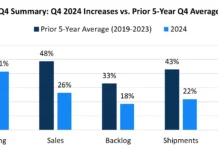by William Carteaux, SPI
Looking back on 2013 – a year marked by partisan bickering in Washington that resulted in the first government shutdown in over 17 years – we in the plastics industry are hopeful that at least a few key issues are ripe for bipartisan solutions in 2014. Importantly, though, where consensus cannot be reached despite our best efforts, we must continue to defend our industry from unwarranted government intrusion and ill-advised legislative or regulatory proposals.
Notwithstanding the 2013 political landscape, the United States plastics industry continued its positive growth and remains the nation’s thriving and robust third largest manufacturing sector.
Toxic Substances Control Act modernization (TSCA)
Modernization of TSCA – the primary federal law governing chemical manufacturing and importation (and, accordingly, use) – must be undertaken in order to take advantage of 21st century advances in science and research methods. However, revisions to standing policy and regulations that ignore risk assessment and the significant socioeconomic benefits of products made with chemicals, such as plastics, could threaten our industry’s ability to develop and utilize essential materials.
Currently in the US Senate, there is a rare opportunity for bipartisan reform of TSCA. The “Chemical Safety Improvement Act” introduced by Senators David Vitter (R-LA) and the late Frank Lautenberg (D-NJ) enjoys a growing bipartisan list of cosponsors. The proposal would provide meaningful pre-emption from states’ “mini TSCAs,” enable a risk-based approach to regulation and protect companies’ Confidential Business Information (CBI).
Medical device tax repeal
The medical device industry is a unique American success story for innovators, manufacturers and consumers alike, and plastics play a huge role in that success. As we see further implementation of the Patient Protection and Affordable Care Act (ACA), the full impact of a $30 billion medical device excise tax encompassed within ACA will have adverse impacts on innovation, R&D and global competitiveness.
Since the enactment of the ACA, a nearly 1,000-strong coalition of organizations has advocated continuously for the repeal of the medical device tax. Earlier this fall, House and Senate negotiators came close to an agreement that would have staved off the tax and its effects, but the effort ultimately failed. Nevertheless, there is a growing, bipartisan view in Congress that the tax must go. Congressional repeal supporters will continue to look for an appropriate legislative vehicle to address this important issue.
Regulatory overreach and Congressional oversight
Our industry understands the need for responsible, science-based regulation. This must be balanced against economic realities and applied in a manner that avoids arbitrary and unnecessary regulation that needlessly diminishes innovation and growth. Out of necessity, SPI expends considerable resources advocating for a less-burdensome regulatory environment. Congressional oversight of federal agencies is paramount to ensuring regulations serve their purpose and include supporting scientific and risk-based evidence for implementation.
Occupational Safety and Health Administration
Regulation and standards activity has ramped up within Occupational Safety and Health Administration (OSHA), and SPI is engaging on issues such as the agency’s recently proposed rule to “Improve Tracking of Workplace Injuries and Illnesses.” OSHA seeks to require employers to electronically report certain injury and illness information, either quarterly or annually based on the number of employees. OSHA plans to post the information online, adding to a significant number of concerns, including how confidential employee information would be protected.
Environmental Protection Agency
EPA has increasingly expanded its chemicals management activities, and sustained industry engagement is needed to ensure EPA does not overreach by unfairly targeting essential chemicals for use restrictions or, worse yet, outright bans. SPI will continue to monitor and respond as warranted to EPA’s regulatory chemicals management proposals.
We also must ensure that EPA does not overstep its authority in determining the scope of “waters of the United States” under the Clean Water Act, an issue that could dramatically expand EPA’s regulatory reach if done wrong. We continue to remind EPA and all regulatory agencies that informal guidance documents are not the favored approach to sweeping policy decisions; when broad action truly is warranted, the appropriate mechanisms are formal rulemakings that ensure the plastics industry’s right to be heard.
Food and Drug Administration
This year, the SPI-led Food Packaging Coalition will continue conversations with Food and Drug Administration (FDA) officials concerning the agency’s proposed rule change and implementation of sections in the Food Safety Modernization Act on the Foreign Supplier Verification Program (FSVP). This program will require costly administrative burdens without commensurate gains in food safety.
The FSVP is designed to align with the Hazard Analysis and Risk Based Preventive Controls (HARPC) program to ensure that food imported into the US is subject to the same degree of scrutiny and protection as is food produced inside the US. Food contact substances, however, are excluded from the HARPC rule, and they present a very low risk to the safety of food.
At no time in history has a foodborne illness outbreak originated with food packaging. In preliminary conversations with FDA, officials have expressed openness both to making the FSVP and HARPC rules consistent with respect to food contact substances and to avoid misdirecting agency and industry resources from areas of greater importance for ensuring the safety of imported food.
Securities and Exchange Commission (SEC) Conflict Minerals Ruling
The SEC has published its final rule regarding the conflict minerals provision of the 2010 Dodd-Frank Wall Street Reform and Consumer Protection Act.
As the rule is written, the definition of conflict minerals may be misinterpreted to include metallic compounds that are materially and chemically distinct from the specific derivatives listed in the rule (tin, tantalum and tungsten, called the “3Ts”). Many plastics industry companies may use small amounts of these metallic compounds in their manufacturing processes. Holding such compounds to exhaustive new reporting requirements would expand the rule’s reach without increasing its effectiveness – counteractive to the rule’s humanitarian goals. The process to correctly report these compounds would require complicated and costly tracking through the product’s supply chain.
For over a year, SPI and a number of partner industry associations have been awaiting a response from the SEC confirming that metallic compounds derived from 3Ts are exempt from the reporting requirements in the final rule.
William (Bill) Carteaux is president and CEO of SPI: The Plastics Industry Trade Association. Founded in 1937, SPI promotes growth in the $380 billion US plastics industry. Representing nearly 900,000 American workers in the third largest US manufacturing sector, SPI delivers broad-based issue advocacy, industry communications and promotion, and the fostering of business relationships through an extensive agenda of conferences. SPI also owns and produces the international NPE trade show, profits from which are reinvested into SPI’s industry services. Find SPI online at www.plasticsindustry.org and www.inthehopper.org.




